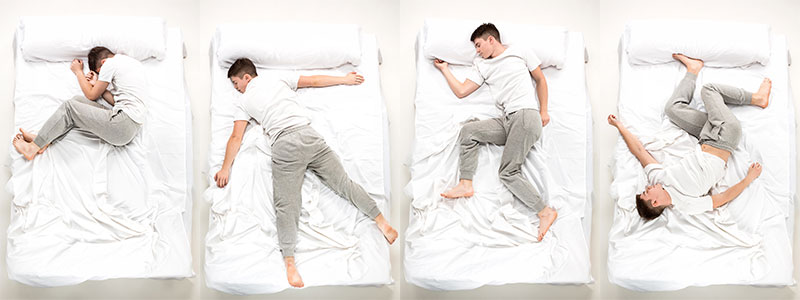Do you experience a frequent cough, shortness of breath, and wheezing? It’s possible you’re dealing with asthma, a chronic respiratory condition characterized by inflammation and narrowing of the airways. Symptoms can vary from person to person, but the most common signs include chest tightness, difficulty breathing, and nighttime coughing. Asthma may be a nuisance in your daily routine, but it’s essential to manage it properly to prevent a severe asthma attack.
Understanding the triggers of asthma is crucial in managing your symptoms. Triggers are environmental factors that induce asthma symptoms. These may include allergens like pollen, dust mites, and mould spores, irritants like smoke and chemical fumes, respiratory infections, and even physical activities. By identifying asthma triggers, you can modify your environment and lifestyle to reduce your exposure and minimize your symptoms.
However, did you know that your sleep can also play a significant role in your asthma management? Let’s explore the relationship between asthma and sleep and how it can impact your health.
The Link Between Asthma and Sleep
Sleep is a time for your body to rest and repair, but for those with asthma, it can be a challenging time. Studies show that symptoms often worsen at night, a condition known as nocturnal asthma. This can be due to various factors such as lying down increasing pressure on the lungs or hormone changes during sleep that can increase inflammation. The result? You may find yourself waking up with a tight chest, wheezing, or even struggling to breathe.
Moreover, the lack of quality sleep due to asthma can lead to fatigue, difficulty concentrating, and reduced quality of life. This makes it even more critical to understand how sleep positions can impact your asthma flare ups and what you can do to achieve a healthy sleep.
The Impact of Sleep Positions on Asthma Symptoms
Sleeping position can significantly affect your breathing, especially if you have asthma.
For instance, lying flat on your back can cause your tongue and soft palate to relax, blocking your airways and exacerbating asthma symptoms. This position, known as supine, can also lead to acid reflux, which can irritate the airways and trigger an asthma attack.
On the other hand, sleeping on your stomach, or prone position, can put pressure on your chest and lungs, making breathing more difficult. Also, this position may strain your neck and back, leading to discomfort and restless nights.
So, what’s the solution? Let’s explore the best sleeping positions for asthma relief.


Exploring the Best Sleeping Position for Asthma
The physical discomfort caused by asthma can make sleep elusive. However, research indicates that certain sleep positions can help alleviate the symptoms of asthma. Here are the three best sleep positions for asthma:
1. Sleeping on Your Back with Shoulders and Neck Elevated
One of the best sleeping positions for asthma is lying on your back with your neck and shoulders elevated with two to three pillows. This position helps open up the airways while sleeping. Also, if your sinuses drain more during the night, sleeping with pillows under your shoulders can provide better drainage due to gravity, making breathing easier and reducing asthmatic attacks.
2. Sleeping on Your Left Side with a Pillow Between Your Legs
Sleeping on your left side has proven to be beneficial for asthma patients. This position increases the airway space, reduces excessive mucus production, and reduces sinus drainage. Adding a pillow between your legs can provide additional support to your spine, improving your sleep posture and making breathing easier.
3. Sitting Position
In severe asthmatic conditions, lying down may not be an option. In such cases, sleeping in a sitting position might be beneficial to keep the airways from becoming blocked. This position involves resting your feet flat on the floor, slightly leaning your chest forward, and resting your elbows on your knees. You can support your head by resting your chin on your hand, all while relaxing your muscles, including both your neck and shoulder muscles.
Worst Sleeping Position for Asthma Patients
While the left side and semi-upright positions can be beneficial for asthma sufferers, some positions can worsen your symptoms. As mentioned earlier, sleeping on your back or stomach can exacerbate asthma symptoms by blocking the airways or putting pressure on the lungs.
Therefore, it’s essential to be aware of your sleeping position and make necessary adjustments to ensure a good night’s sleep and better manage your asthma.
The Role of a Good Night’s Sleep in Managing Asthma
A good night’s sleep is more than just feeling rested. For those with asthma, quality sleep can play a crucial role in managing symptoms and overall health. Restful sleep can help your body repair and rejuvenate, reducing inflammation and strengthening your immune system. Moreover, it can help you feel more alert and energetic, improving your quality of life.
On the flip side, poor sleep can lead to fatigue, poor concentration, and increased stress, which can worsen your asthma symptoms and trigger an asthma attack. Therefore, investing in quality sleep is an essential part of your asthma management plan.
Pure Latex Mattress: A Solution for Asthma Sufferers?
Did you know that your mattress can also play a part in managing your asthma? Natural latex mattresses are gaining popularity among asthma sufferers due to their hypoallergenic and antimicrobial properties. These mattresses are known to resist dust mites, a common asthma trigger, reducing your exposure and minimising your symptoms.
Pure latex mattresses can provide excellent support and comfort, promoting proper spinal alignment and reducing pressure points. This can help you maintain the best sleeping position for asthma relief and ensure a good quality sleep.
How to Achieve Quality Sleep with Asthma
Managing your sleep with asthma may seem challenging, but with the right strategies, you can ensure a good night sleep. First, identify and control asthma triggers in your sleeping environment. This may include using hypoallergenic bedding, keeping your room clean and dust-free, and maintaining a cool and humid-free environment.
Next, practice good sleep hygiene. This includes maintaining a consistent sleep schedule, creating a relaxing bedtime routine, and ensuring your bedroom is dark, quiet, and comfortable. Finally, consult with your healthcare provider or a sleep specialist to discuss your symptoms and explore treatment options.
Nocturnal Asthma: Causes and Precautions
As we’ve discussed earlier, nocturnal asthma, or worsening of asthma symptoms at night, can significantly impact your sleep and health. It’s often caused by factors such as lying flat, hormonal changes during sleep, or exposure to allergens in your bedding or room.
To manage nocturnal asthma, it’s crucial to maintain a clean sleeping environment, use hypoallergenic bedding, and consider sleeping in a semi-upright position. Moreover, ensure to take your prescribed asthma medications and discuss your symptoms with your healthcare provider.
The Effect of Dust Mites on Asthma and Sleep
Dust mites are tiny creatures that thrive in warm, humid environments like your bedding or carpet. While they are harmless to most people, they can be a common trigger for asthma sufferers. Dust mite exposure can lead to inflammation in the airways, causing asthma symptoms like coughing, wheezing, and shortness of breath.
To protect yourself from dust mites, consider using allergy-proof covers on your mattress and pillows, washing your bedding in 65 degree water regularly, and keeping your room clean and dust-free.
Conclusion: How to Relieve Symptoms for a Better Night’s Sleep with Asthma
Asthma can significantly impact your sleep, but with the right strategies, you can manage your symptoms and ensure a restful night. This includes understanding your asthma triggers, maintaining a clean sleeping environment, choosing the best sleeping position for asthma relief, and considering options like natural latex mattresses.
Remember, a good night’s sleep is a crucial part of your asthma management plan, so don’t underestimate its importance. If you’re struggling with sleep due to asthma, don’t hesitate to seek help.
Speak to our Sleep Specialists Today and find out what the best mattress is for Asthma sufferers. With the right guidance and solutions, you can achieve restful sleep and better manage your asthma.




